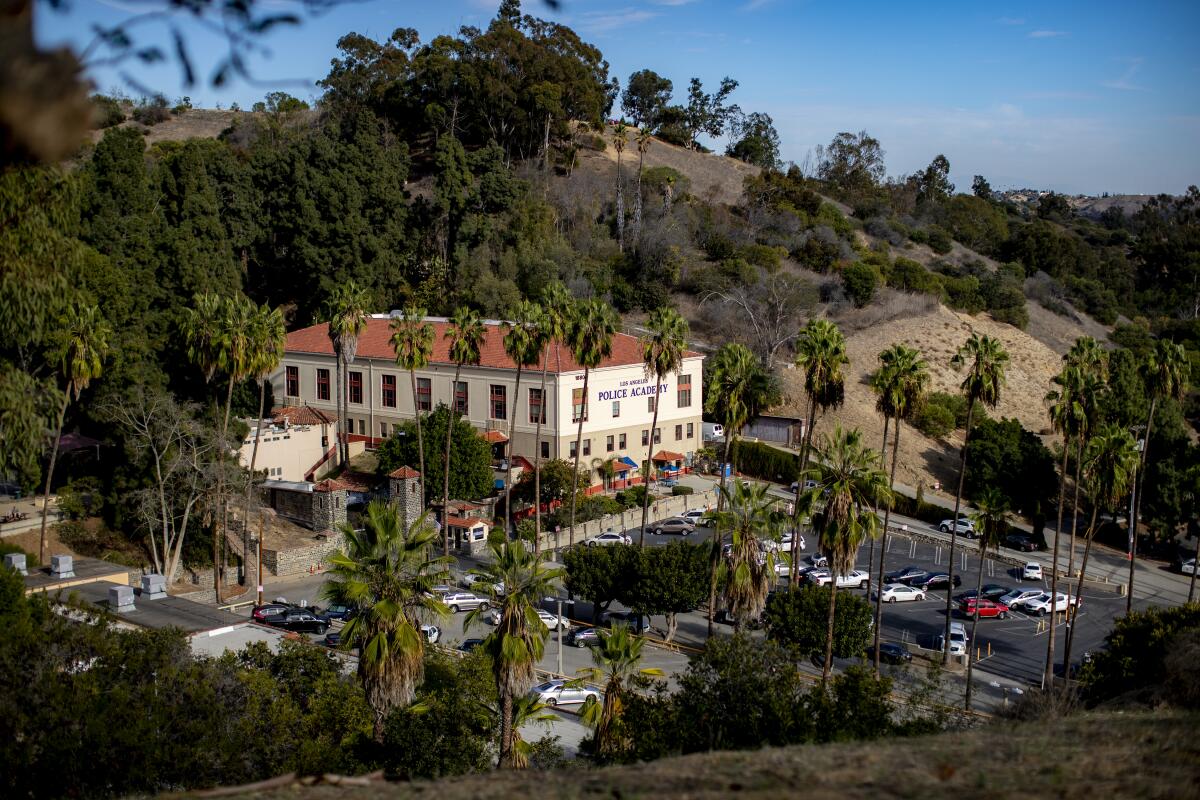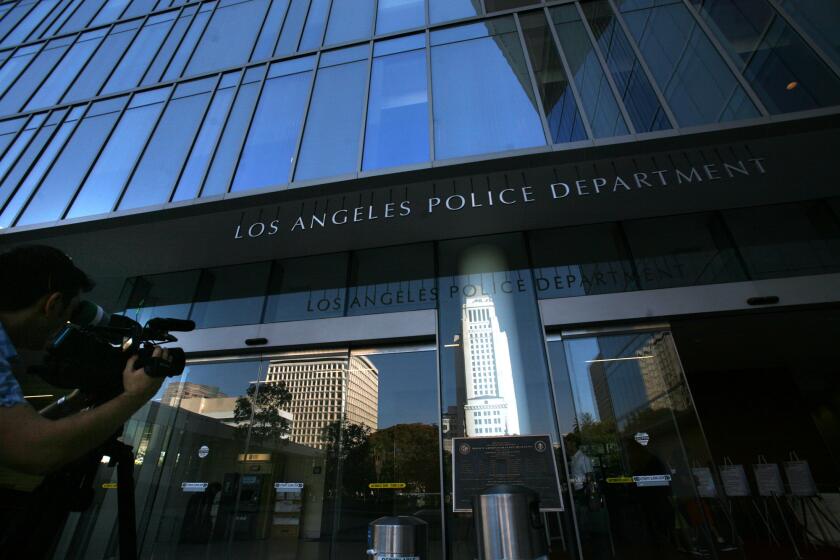L.A. accuses LAPD academy gun store of negligence, breach of contract as scandal widens

- Share via
The city of Los Angeles has accused the operator of a gun store located within the Los Angeles Police Academy of negligence in its operations and breach of contract, the latest twists in a widening scandal involving stolen firearms landing in the hands of LAPD officers.
The claims, made in multiple court cases in the last week, mark the first time since the broader scandal broke last year that the city has taken direct aim at the Los Angeles Police Revolver and Athletic Club, a nonprofit organization and gun store with which the city has maintained a relationship for more than 85 years.
The city accused the store of sloppy management and record keeping, of breaching its lease agreement by failing to obtain the proper insurance for the store, and of negligence in its hiring, training and supervision not just of Archi Duenas, the store manager who was convicted of gun theft in the case, but also of at least four other employees, including general manager Ruben Crane.
“LAPRAAC knew or should have known that its employees and managers were unfit for the specific and mandatory tasks to be carried out and performed during the course and scope of their employment, such as adequately preparing and maintaining paperwork and records, conducting and periodically auditing its firearm inventory, and ensuring proper compliance with state and federal firearm dealer regulations, amongst other things, and that this unfitness created a particular risk to others,” the city’s attorneys wrote.
Crane declined to comment on the city’s claims Friday, as did LAPRAAC’s attorneys.
According to an investigation by The Times, the theft of 44 guns from an L.A. gun store has spurred a cascade of allegations against LAPD officers and a roiling department scandal.
The city’s claims were made as part of an effort to deflect responsibility in a handful of lawsuits filed by LAPD officers who were caught up in the scandal and now say their reputations were unjustly tarnished because of the collective negligence of the gun store, the city and the LAPD.
Whether the city’s arguments hold up in court could help determine whether and to what degree city taxpayers are left on the hook to pay monetary damages to those officers if their lawsuits are successful.
Regardless, the arguments are the first from the city that take the position that the gun store was not simply the victim of a rogue employee, but was negligent itself — a claim also made by the suing officers.
The thefts of dozens of weapons from the store led last year to the arrest and later conviction of Duenas, but also sparked a sprawling investigation into several LAPD officers to whom Duenas had sold some of the stolen weapons. Investigators served search warrants at multiple officers’ homes, accusing some of knowingly buying the stolen weapons and others of leaving loaded firearms in places accessible to children. Ten of the weapons remain missing.
The officers denied knowing that the weapons were stolen, or any wrongdoing on their part. Still, the scandal grew as investigators dug deeper and the captain who initially oversaw the investigation accused top commanders in the LAPD of trying to impede it.
Investigators presented cases against several officers who were found in possession of stolen firearms to prosecutors, alleging the officers knowingly purchased the weapons. Prosecutors have declined to file criminal charges against some of those officers, citing insufficient evidence, and are still reviewing cases against others.
Among those officers whom prosecutors declined to file charges against were former Det. Victor Brown, who was allegedly found in possession of three stolen firearms, and Sgt. Gus Murra, who was allegedly found with five stolen weapons. A separate case alleging Murra left a loaded firearm accessible to his young daughter is still pending before the city attorney.
Brown, who retired in February, and Murra have since joined three other officers — Jerry Fritz, Louie Gener and Jacob Palacios — in suing LAPRAAC, the city and the LAPD over allegations that their negligence allowed Duenas’ crimes to occur and baselessly embroil the officers in the ensuing scandal, violating their rights, causing them emotional distress and permanently marring their professional records, with significant monetary repercussions, in the process.
LAPD Police Academy former gun store manager charged with stealing more than 20 guns
In court filings, the officers’ attorneys have argued the store, the city and the LAPD were all responsible for the security lapses that allowed the guns to be stolen and subsequently sold to the officers, writing that the store “negligently sold, stored, delivered, and otherwise handled firearms” while the city of L.A. and the LAPD failed to ensure that “basic firearm laws and regulations were being followed on their own campus.”
In its own court filings, attorneys for the city rejected that notion, arguing that the store alone was responsible for the lapses, and that it should therefore cover the city for any damages that may have to be paid out in the officers’ cases.
The city’s attorneys said that a long-term lease agreement between the city and LAPRAAC required the gun store to secure insurance that protected it and the city against damage claims, and to fully indemnify the city against any costs that may arise from such claims.
That LAPRAAC had failed to obtain that insurance and is refusing to cover the city in the litigation, the city’s attorneys said, warranted court intervention to force LAPRAAC to honor the agreement and cover the city’s costs.
The city’s arguments in court seek to distance it from LAPRAAC and the management of the store — and in that way echo statements in recent days from various police officials.
In a letter drafted by LAPD Chief Michel Moore and posted online Wednesday to rebut a characterization of the broader scandal by The Times’ editorial board, Moore wrote that “the store itself is not operated, managed or overseen by the LAPD (any more than any other licensed firearms dealer in the City).”
On Thursday, Police Commission President William Briggs reiterated the same point in an interview with The Times, saying, “This whole thing that you guys have been reporting on has been skewed, in my opinion, to make the LAPD look bad.”
The LAPD “does not operate that [gun] shop,” Briggs said.
Others say police officials and city attorneys are simply trying to wash their hands of a scandal that could cost the city big in court.
Matthew McNicholas, an attorney for the suing officers, said the city, the LAPD and LAPRAAC were all liable for the harm caused to his clients on the LAPD’s academy campus, regardless of whether the city is indemnified for all or a portion of the costs by LAPRAAC.
He also said the fact the city never checked to ensure it was covered by LAPRAAC’s insurance policy was simply more proof that it was negligent in its oversight of the gun store.
“That is consistent with our entire theory in the case: that they didn’t do their diligence and they didn’t have sufficient oversight,” McNicholas said.
According to records provided to The Times by the city, the city entered its first agreement with LAPRAAC in 1935, and its relationship with the gun shop ever since has been defined in part by dueling ownership rights to campus grounds and buildings by the city and the nonprofit.
In 2011, the city and LAPRAAC discussed a renewed agreement that would see LAPRAAC cede certain of those ownership rights to the city, while also establishing a new 55-year lease agreement in which LAPRAAC would maintain its space in the building for just $1 a year.
The city provided The Times with a copy of that agreement, which appeared to be signed by someone from LAPRAAC but was undated and unsigned by anyone from the city. The agreement was provided as an attachment to a separate document related to renovations to the police academy, which was dated October 2011 and stated that the agreement was approved by the LAPRAAC board earlier that year.
The agreement states that LAPRAAC “shall indemnify” and hold the city harmless for “any and all loss, liability, or expense for claims for injury or damage arising or alleged to arise from the acts or omissions of LAPRAAC” or any of its employees.
However, it also states that, in “the event of third-party claims made against both parties in which liability is attributed to the negligence or wrongful act or omission of both LAPRAAC and [the city], the ultimate financial responsibility of each party shall be in accordance with its percentage of fault or as may otherwise be mutually agreed between LAPRAAC and [the city].”
In a September letter to city officials, Michael Kanne, an attorney for LAPRAAC, wrote that LAPRAAC “has determined that it does not have a duty to defend nor indemnify” the city in any of the officers’ lawsuits, and that the city should prepare to mount its own defense.
Kanne did not respond to a request for comment. Rob Wilcox, a spokesman for the city attorney’s office, said the city could not comment on the litigation.
Wilcox did confirm, however, that LAPRAAC’s lease within the LAPD academy was still in place.
More to Read
Sign up for Essential California
The most important California stories and recommendations in your inbox every morning.
You may occasionally receive promotional content from the Los Angeles Times.













